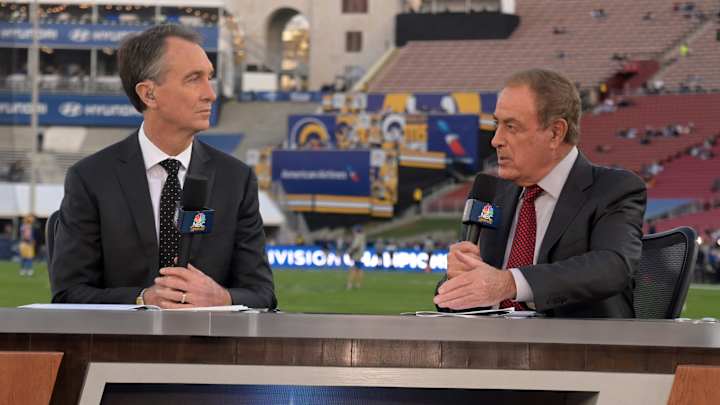Why Did the Super Bowl Broadcast Gaslight Audience About Odell Beckham?

Odell Beckham Jr. is good for business in the media. There is an insatiable appetite for most anything he says or does. Most every outlet is going to come up with ways to capitalize, which took an odd turn for the Super Bowl.
Carried by NBC this year, Beckham was a featured part of their broadcast, something that had been done in every round of the playoffs in games featuring the Los Angeles Rams regardless of the network that carried the game. NBC's broadcast booth of Al Michaels and Cris Collinsworth both took individual swings at explaining how wide receiver Odell Beckham Jr. was acquired by the Rams after being released by the Cleveland Browns.
Each painted Beckham as a victim. Collinsworth went as far as saying the Browns kicked Beckham to the curb, leaving him nowhere to go. Believing in himself against the odds, Beckham proved them wrong, helping the Rams get to the Super Bowl they would go on to win.
The only problem is that isn't what happened. In fact, the story they told was so far from the truth that fans in Cleveland who were supportive of Beckham, even rooting for him to win this game, were struck by what they were hearing.
Beckham asked to be traded going into the season. The Browns wouldn't and likely couldn't because his $14.5 million salary was fully guaranteed as a result of the torn ACL he suffered in 2020. He asked again ahead of the trade deadline, once again told no.
The day of the trade deadline, a video was posted to the social media accounts of his father, Odell Beckham Sr., trashing both quarterback Baker Mayfield and head coach Kevin Stefanski, blaming them for Beckham's lack of impact.
Though Beckham maintains he had nothing to do with the video, he wouldn't answer phone calls from teammates or the head coach over the next 24 hours. Most everything that happened from that point until his release occurred between Beckham's agent and the team's general manager, Andrew Berry.
Rather than simply shutting Beckham down for the rest of the year, the Browns negotiated a restructured contract that slightly reduced their salary burden giving them some salary cap savings while eliminating the remaining two years on Beckham's contract. That would ensure that if a team claimed Beckham on waivers, he would be a free agent after the season, allowing him to determine his own fate.
Beckham cleared waivers and signed with the Rams, still positioning himself for free agency. Leading up to the Super Bowl, Beckham was starting a campaign about this being the rebirth to his greatness, a second act.
Had the Super Bowl broadcast simply acknowledged that Beckham wanted out of Cleveland and actions took place that greased the skids to ensure it would happen, there were plenty of people that were more than happy to declare him a hero under those circumstances.
All of this begs the question, why? Why didn't simply acknowledge that Beckham wanted out?
If pressed, the answer will likely be blamed on getting bad information. Possible, but this wasn't a difficult story to research and two weeks of prep was plenty of time to get it right. The fact that each of them took time to provide an inaccurate account of what happened didn't feel accidental.
They weren't alone either. ESPN got in on this bizarre reimagining as well. Adam Schefter, in a now deleted tweet, posted the same picture with the tag line, "To all those who said it couldn't be done:"
Matthew Stafford and OBJ win the Super Bowl on their first trip 💪 pic.twitter.com/5cZI4nyQKq
— ESPN (@espn) February 14, 2022
Nobody has been more supportive of Beckham than Jarvis Landry, who even jumped on his media conference call during Super Bowl week to encourage him. Calvin Johnson hasn't played since 2015, has already been selected to be inducted into the Pro Football Hall of Fame.
So why did two major NFL broadcasting partners get into the business of writing a new script for this story, one that rings about as true as the movie Rudy?
Given the sheer amount of star power attached to Beckham, it appears as though the NFL didn't want to provide any breathing room to the idea that Beckham engineered the outcome he wanted, despite a suggestion from Von Miller that's exactly what happened.
The NFL has no interest in giving players more power than it is absolutely necessary and will not abide players taking control. They view the NBA, a league where superstar players are often able to dictate what teams they play for and league policy as a cautionary tale.
Former San Francisco 49ers quarterback Colin Kaepernick wasn't blackballed for what he said. Rather, it's what he did. Kaepernick represented what might happen if a player could not be controlled by the league and 32 billionaires had no interest in abiding it. They took away his platform by taking away his job. Kaepernick, along with former teammate Eric Reid, sued the league for collusion, a matter that would be settled out of court.
Beckham still has too much juice in the NFL, so it seemed easier to offer a retelling that benefits Beckham while suiting the league's needs. Beckham, his camp likely had no part in this, but they aren't going to dispute this version of events either. When the Browns are asked at some point, they will simply say they have no interest in revisiting the issue as a matter of team policy, allowing the issue to neatly vanish.
Maybe there's a better explanation for what happened. I'm all ears. The Super Bowl didn't need help being sold and neither did Odell Beckham Jr., so why was there an attempt to gaslight audiences as to what happened in Cleveland?
